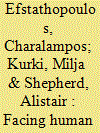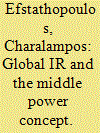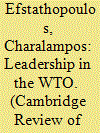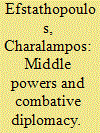|
|
|
Sort Order |
|
|
|
Items / Page
|
|
|
|
|
|
|
| Srl | Item |
| 1 |
ID:
175164


|
|
|
|
|
| Summary/Abstract |
Communities on the planet are faced with complex challenges: changing relations within and between human communities, changing relations with ecological and climatic conditions, and shifts in technology-human interconnections. The complex interconnections across issue areas – migration, environmental degradation and new technologies, for example – demand that scholars increasingly think across theories, paradigms, specialisms and disciplines. But how should we ‘hold things together’ as we try to make sense of complex realities in International Relations (IR)? This introductory article to the Special Issue ‘Facing human interconnections: thinking International Relations into the future’ discusses the open thematic of ‘human interconnections’ that is used to loosely structure the contributions. Analysis of human interconnections, as understood here, does not have a precise or fixed definition but is considered an open-ended notion with varied meanings and dimensions. Indeed, the authors engage it here in varied ways to explore their empirical, theoretical and political concerns. Yet, this notion also allows for interesting new questions to be posed on the potential and limits of IR as it faces the future, and debates around how we see interconnections between issue areas and ‘-isms’, how IR constructs ‘humans’ or ‘non-humans’ in interconnections, and what is at stake in bringing to our attention unacknowledged interconnections. Here we set out why human interconnection is an interesting notion to work with and why we need to keep its meaning open-ended. We also provide an account of six different orientations we observe amongst the authors tackling the dynamics of human interconnections in this Special Issue.
|
|
|
|
|
|
|
|
|
|
|
|
|
|
|
|
| 2 |
ID:
192079


|
|
|
|
|
| Summary/Abstract |
The premise of Global IR for greater pluralism and inclusivity allows for reconsidering the relevance of established concepts in the IR discipline. This article discusses how Global IR can contribute to rethinking the question of agency in the middle power concept. While the concept has been used in a Western and non-Western context, there is a tendency to adopt a binary distinction between Western middle powers that are conformist in their approach to the liberal international order and Southern middle powers that adopt a reformist stance. The article argues that a Global IR approach can help overcome this dichotomy and open up the study of Western and Southern middle powers to new agential possibilities. To demonstrate this, the article discusses how the cases of Australia and Brazil are not limited to conformist and reformist middle power agencies respectively. The discussion shows how the two states have undergone periods of ambivalence to gradually project new forms of middle power agency that alter and redefine their roles within the liberal international order.
|
|
|
|
|
|
|
|
|
|
|
|
|
|
|
|
| 3 |
ID:
115980


|
|
|
|
|
| Publication |
2012.
|
| Summary/Abstract |
The Doha round of multilateral negotiations has witnessed the relocation of Southern powers towards the core of the World Trade Organization (WTO) decision-making structure. Brazil and India are the only developing countries that have participated consistently in all major ministerial phases of the Doha round between 2001 and 2008. Their consolidation as trading powers cannot be attributed solely to their status as emerging economies. Their projected legitimacy as representatives of the global South has operated as a catalyst in facilitating their relocation. In various phases of negotiations, however, Brazil and India have refrained from playing a proactive role in driving negotiations forward. Their defensive stance has raised questions about the two countries' prospects for systemic leadership in world trade. In explaining this condition, this article will argue that Brazilian and Indian trade diplomacy is consistently directed towards maintaining broad bases of followership. Brazil and India are disposed to exercise assertive leadership only when that accommodates the expectations and preferences of their followership in the global South. Their preoccupation with constantly reasserting their Third World image often renders blocking agreement the preferable strategy to avoid paying a high price in terms of legitimacy.
|
|
|
|
|
|
|
|
|
|
|
|
|
|
|
|
| 4 |
ID:
111570


|
|
|
|
|
| Publication |
2012.
|
| Summary/Abstract |
Middle Powers are generally understood to perform diplomatic functions of constructive engagement and consensus-building to facilitate agreement in international negotiations. Middle Powers may, however, adopt more confrontational roles, especially when their accommodative functions become deficient. Whilst theoretical perspectives on Middle Powers account for such roles, limited empirical evidence has been provided to explore the conditions under which they revert to combative diplomacy. This article contributes to this area by examining the role of South Africa in the 2003 Cancun Ministerial Conference of the World Trade Organisation. During this period, South Africa shifted to a more confrontational approach epitomised by the heightening of its public diplomacy against developed countries and its co-leadership of the G-20 coalition of developing countries. The Cancun Ministerial collapse reflected both the possibilities and limitations of combative diplomacy as South Africa enhanced its international prestige but failed to extract any meaningful concessions, whilst triggering the threat of diplomatic retaliation by the major trading powers.
|
|
|
|
|
|
|
|
|
|
|
|
|
|
|
|
| 5 |
ID:
182601


|
|
|
|
|
| Summary/Abstract |
The current challenges facing the liberal international order suggest there is greater need for reassessing the roles that different categories of states may perform in support of this order. Middle powers appear as leading candidates for a supportive role to the liberal order due to their historical commitment to internationalism, coalition building with like-minded democracies and activism within multilateral institutions. Such orientation, however, is questionable for Southern middle powers that often appear ambivalent in their foreign policies, restricted in their collaboration with other democracies and selective in their multilateral initiatives. This article discusses the cases of Brazil and South Africa to examine the current options for Southern middle powers and concludes that despite certain limitations, South Africa is, overall, closer to assuming a supportive stance towards the liberal international order and its institutions.
|
|
|
|
|
|
|
|
|
|
|
|
|
|
|
|
|
|
|
|
|